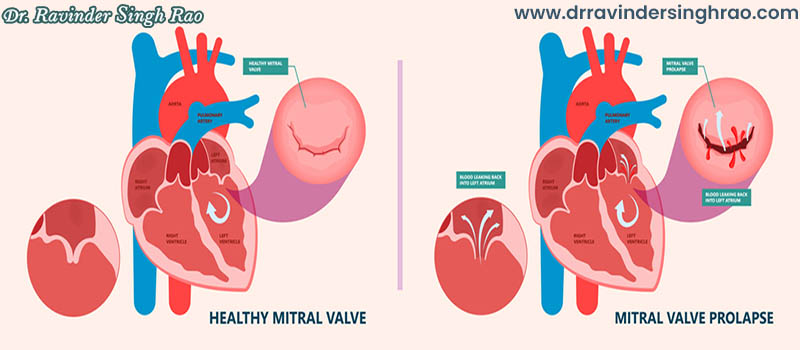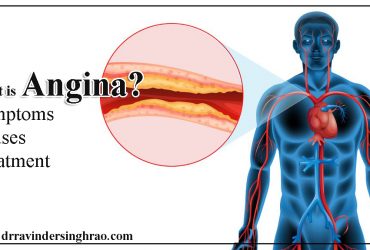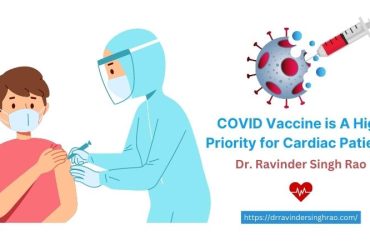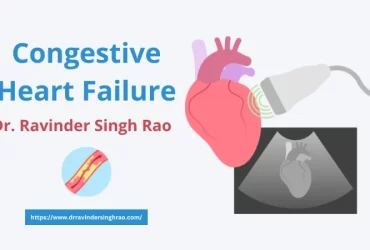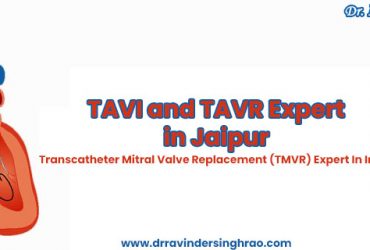The mitral valve is a crucial component of the heart that regulates the flow of blood between the left atrium and the left ventricle. It consists of two flaps, or leaflets, that open and close in a coordinated manner to allow blood to flow in one direction and prevent it from flowing back.
In mitral valve disease, the mitral valve is located between your left heart’s chambers that are left atrium, and the left ventricle, and doesn’t work properly. Timely diagnosis and treatment of mitral valve disorders are essential to prevent serious complications and improve the quality of life. Dr. Ravinder Singh Rao is the Top Heart surgeon and Best Heart Doctor of Mitral Valves in Jaipur, India.
Types of Mitral Valve Disease | Best Heart Doctor of Mitral Valve- Dr. Ravinder Singh Rao
Moreover, your heart keeps four valves for keeping blood flow in the right direction. Therefore, these four valves are- mitral valve, tricuspid valve, pulmonary valve and aortic valve. Each valve has flaps (leaflets or cusps) for open and close during the each heartbeat. Generally Mitral Valve Disease is two types. So, these are:
Mitral valve regurgitation
- In this condition, the leaflets of the mitral valve don’t close tightly and the cause of this the blood is leaking backward into the left atrium of your heart. And if it is not treated, it can be damage your heart muscle.
Mitral valve stenosis
- In this condition, the flaps (leaflets) of the mitral valve become thick or tough, and they may close up together. This result is that they open in a narrowed valve and reduced blood flow from the left atrium to the left ventricle. Even, your doctor Complicated Angioplasty Expert in India is eventually recommends that you have surgery to repair or replace your mitral valve.
Symptoms | Dr. Ravinder Singh Rao
Most of the people of mitral valve disease may not experience the symptoms for many years. In mitral valve disease signs and symptoms may include:
- Abnormal heart sound or heartbeat(heart murmur) heard through a stethoscope
- Irregular heartbeat
- Feeling shortness of breath, particularly when you have been doing physical activity or when you lie down
- Fatigue
Causes
Consequently, Mitral valve disease has many causes. In some forms of mitral valve disease is may be present at birth that is known as congenital heart defect.
Mitral valve regurgitation can be caused by the problems of the mitral valve that is also called primary mitral valve regurgitation. Additionally, Mitral valve regurgitation is often reason by mitral valve prolapse, in which the mitral valve flaps raise back into the left atrium. As well as, left ventricle diseases can lead to secondary mitral valve regurgitation.
Risk factors
There are several risk factors that can increase your risk of mitral valve disease, including:
- Older age
- Any past history of certain infections that is relevant to heart disease
- Any past history of certain forms of heart disease or heart attack
- History of habitual of certain drugs
- Heart conditions present at birth (congenital heart disease)
- Any type of radiation to the chest
Complications
Mitral valve disease may also have many complications. These are:
- Irregular heart beat in the upper heart chambers (atrial fibrillation)
- Having High blood pressure that affects the blood vessels in the lungs
- Heart failure
- Blood clots
- Stroke
Diagnosis
Your doctor Structural Heart Expert in India may evaluate your signs and symptoms and conduct a physical test. Even, your doctor may also conduct several tests to diagnose your condition. So, in these tests may include:
- Echocardiography. In this test, sound waves are using to build video images of your heart in motion. This test helps your doctor to recognize a close look at the mitral valve and check how well it’s working. This test gives your doctor a closer look of your mitral valve that is possible with a regular echocardiogram.
- Electrocardiogram (ECG). In this test wires (electrodes) are attached with pads on your skin scale electrical signals from your heart. This ECG test is detecting the enlarged chambers of your heart, heart disease and abnormal heart rhythms or heartbeat.
- Chest X-ray. A chest X-ray is also help to determine the condition of your lungs.
- Cardiac MRI. This test may be done to determine the serial problem of your heart condition.
- Exercise tests or stress tests. Different exercise and tests may help to measure your activity tolerance and monitor your heart’s response to exercise.
Treatment
The treatment of is depends on your symptoms, the intensity of the condition. Also, a doctor trained of Angioplasty Expert in India will provide your care. So, the treatment may include:
- Monitoring your heart condition with regular follow-up appointments
- Making healthy lifestyle changes with diet and exercise
- Taking proper healthy medications to treat symptoms
- Taking blood thinners treatment to reduce the risk of blood clots when if you have a certain irregular heartbeats called atrial fibrillation
Dr. Ravinder Singh Rao has always been the best in this field. Hence, if you have any kind of heart related issues, go and consult with Heart Valve Expert in India.

